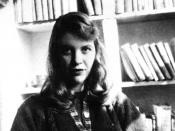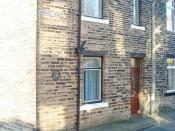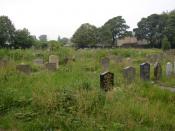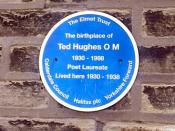"The Tender Place" is an affectionate poem in which Ted Hughes contemplates and describes the Electroconvulsive Therapy (ECT) inflicted on Sylvia Plath. The human impulse behind this poem is to bring across the negative impact and effects this anti-depression therapy has on her. Through this poem, the horror and needless destruction that such therapy implicates is conveyed very impressively.
In the first lines, Ted Hughes refers to Sylvia Plath's temples, where the electrodes for ECT are placed, as "the tender place". The word "tender" reveals the fragility and delicacy of this place or even of her body as a whole. The electro shocks contrast harshly with the place where they are given, already suggesting the brutality of it all.
As the speaker carries out an experiment to see the effect of electricity of a twelve-volt battery on a file, he states that "it exploded like a grenade". This hyperbole brings across very efficiently that the speaker is amazed at how powerful these small electro shocks can be and makes the reader question what destructive effect it then could have on a brain when it is more powerful.
Other very powerful images are similarly used by Ted Hughes to bring across what he imagines is happening in her brain, merely, violent explosions, burning and pain. The fact that he states "they" did it, suggests a desire to condemn these characters. This is also brought across in the fifth and sixth line through the repetition of "Somebody", as if he wished he could use names, showing the frustration of not being able to do so:
"They crashed The thunderbolt into your skull"
The doctors' carelessness is brought across in the tenth and eleventh line. He suggests that they were not concerned about her as a person, but simply about whether her teeth were still whole. Ted Hughes cleverly mentions the teeth to inform the reader that losing her teeth was truly possible, adding to the horror of ECT and making it seem insanely brutal:
"They hovered again To see how you were, in your straps. Whether your teeth were still whole."
Throughout the whole poem, Ted Hughes talks about the Electroconvulsive Therapy inflicted on Sylvia, as if she had not done it voluntarily but was done to her forcefully against her will. This idea is particularly emphasised in the fourteenth line, where Ted Hughes uses the word "pushed", which has connotation of obligation and unwillingness. The word "squirm" used to describe the sensation, again reminds us of the electricity passed through her body and gives the reader the image of a twisting and contorted motion and the struggle that such movement implicates.
"Again feeling nothing Except feeling nothing pushed to feel Some squirm of sensation."
In the next line the speaker suggests that she has become the personification of terror at the perspective of the electro shocks that await her. Ted Hughes refers to them as "lightnings", again emphasising their strength and power. In line 17/18, the speaker tells what he sees when he imagines these "lightnings" reaching her body, namely, "An oak limb sheared at a bang". This brings across the speed but at the same time violence he sees in this act. She, on the other hand, sees her "Daddy's leg". In 1940, Sylvia Plath's father, Otto Plath, had one of his legs amputated when she was eight years old. One month after this he died. "Your Daddy's leg" might therefore be referring to this event in her life, which might be a relatively impressive image or experience for a little girl, remaining in her mind for years. Now the speaker imagines that this anti-depression therapy makes this image come up again in her mind.
In the lines 23/24, Ted Hughes questions himself about what was destroyed, or what was lost in her mind through ECT, which part of her brain damaged. He then compares the molten copper in his experiment to what is melting in her brain. In the next lines very strong imagery is used to describe the medical effects of ECT. According to the speaker "the nerve threw off its skin" and compares it with a child on fire escaping a bomb-flash. This extremely powerful image brings across the pain, burning and violence Ted Hughes wants to convey very efficiently.
"And the nerve threw off its skin Like a burning child Scampering out of the bomb-flash."
Then he compares her to a "rigid bent bit of wire across the Boston City grid", communicating the fragility of her body in contrasts with the fatal effects the electrical power inflicted on her could have. He then imagines that the electrocutions are so strong that enough electricity is being used for the lights in the Senate House to dip.
According to Ted Hughes, her voice is merely diving inwards through this therapy, suggesting that the problem is not solved whatsoever, but hidden temporarily. This idea is backed up by the fact that her voice "comes back, years later". The fact that her scars are "scorched-earth" again makes reference to the electrocutions, meaning that damage and destruction have been caused in her brain through a superficial burning.
In the last lines it is revealed that although her voice came back, her words were not facing the light and were "holding in their entrails", suggesting that there has been traumatising damage done to them as well as her.
I personally find this poem exceptionally moving and personal. Ted Hughes' use of imagery is excellent at communicating feelings and sensations. This poem makes the reader feel he has had the treatment done to himself because of the extremely detailed information which is given about the immediate physical effects of ECT. This poem has a tone of anger as well as intense helplessness. The speaker seems to be very affected by the negative impacts this is having on her friend or lover, implying how much he cares about her and what she is going through.






